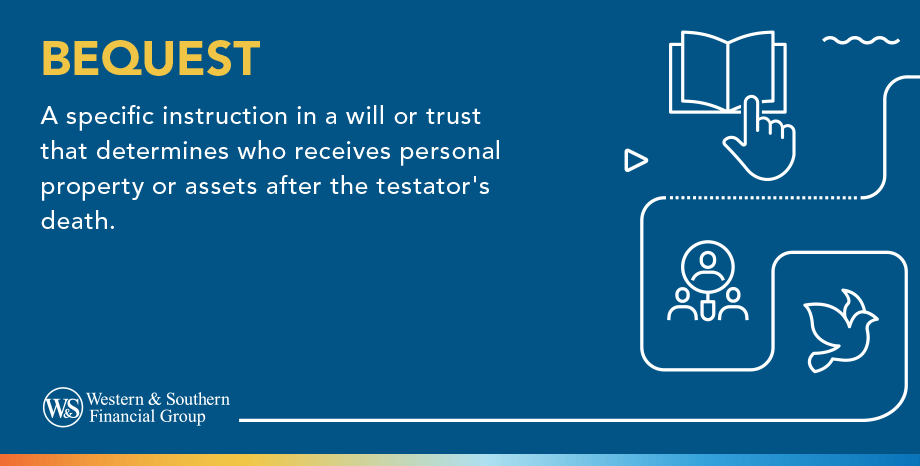

Key Takeaways
- A Bequest is a specific instruction in a will or trust that determines who receives personal property or assets after your passing.
- Specific, general, residuary, and other bequest types offer differing levels of control.
- Bequests help minimize conflicts and fulfill the testator's specific wishes for asset distribution.
- Including bequests offers several benefits, including legacy creation and potential tax advantages.
- Seeking professional guidance is key for aligning bequests with estate goals.
What Is a Bequest?
A bequest is a specific instruction within a will or trust that dictates the transfer of personal property, assets, or a portion of the estate to individuals, organizations, or entities after the death of the will's creator, known as the testator. It represents a powerful estate planning tool, enabling individuals to ensure that their wishes regarding the distribution of their assets are honored upon their passing. Bequests can encompass a wide range of asset types, including cash, real estate, stocks, and personal items like jewelry or art.
What Are the Different Types of Bequests?
Each type of bequest serves different purposes and offers various levels of specificity and flexibility in estate planning. Choosing the right mix of bequests can help ensure that an individual's final wishes are accurately and efficiently carried out, minimizing potential conflicts and ensuring that beneficiaries receive their intended inheritance. Here's a breakdown of the most common types:
Specific Bequest
A specific bequest is a testamentary gift of a particular piece of property or a specified asset to a designated beneficiary. This can include real estate, a particular stock, a specific bank account, artwork, jewelry, or any other item the testator owns. Because it refers to particular items, they must be clearly described in the will to avoid confusion.
Example: "I bequeath my grandmother's pearl necklace to my sister, Alice."
General Bequest
General bequests are not tied to any specific asset but rather designate a general sum of money or a percentage of the estate's assets to be given to a beneficiary. This type of bequest is fulfilled from the general assets of the estate and is often used for monetary gifts, such as leaving a certain sum of money to multiple beneficiaries.
Example: "I bequeath $25,000 to my nephew, James."
Demonstrative Bequest
A demonstrative bequest is similar to a general bequest but specifies a particular account or asset source for the bequest. This type of bequest combines elements of both specific and general bequests.
Example: "I bequeath $50,000 from my savings account #12345 to my local animal shelter."
Residuary Bequest
After all specific, general, and demonstrative bequests are distributed, and all debts, taxes, and estate expenses are paid, the remainder of the estate is often left to one or more beneficiaries through a residuary bequest. This catch-all category ensures that any assets not explicitly mentioned in the will are distributed according to the testator's wishes.
Example: "I bequeath the remainder of my estate to be divided equally between my two children."
Contingent Bequest
Contingent bequests only take effect if certain conditions are met at the time of the testator's death. For example, a testator might leave a portion of their estate to a charity, provided that a particular beneficiary predeceases the testator. Contingent bequests are helpful in planning for various future scenarios and ensuring that the testator's wishes are carried out under specific circumstances.
Example: "I bequeath my vacation home in Florida to my sister, Elaine, only if she survives me by more than 30 days."
Conditional Bequest
A conditional bequest is similar to a contingent bequest but is predicated on the beneficiary meeting some condition or milestone, such as graduating from college. The fulfillment of the bequest is dependent on the occurrence of the condition specified by the testator.
Example: "I bequeath $100,000 to my granddaughter, Emily, provided she graduates from an accredited "university.
Each type of bequest serves different purposes and offers various levels of specificity and flexibility in estate planning. Choosing the right mix of bequests can help ensure that an individual's final wishes are accurately and efficiently carried out, minimizing potential conflicts and ensuring that beneficiaries receive their intended inheritance. Proper legal advice is crucial in drafting these bequests to avoid ambiguities and ensure that the will is executed as intended.
How Do Bequests in a Will Work?
Bequests in a will work as explicit instructions from the person creating the will (testator) regarding the distribution of their assets after their death. Here's a step-by-step overview of how bequests in a will typically work:
1. Creation of the Will
The process begins with the testator drafting a will, a legal document that outlines how their assets should be distributed upon their death. This includes making specific bequests, which are instructions within the will that designate certain assets, sums of money, or percentages of the estate to specific individuals, organizations, or entities.
2. Specifying Bequests
In the will, the testator stipulates how their assets and belongings will be distributed after their passing, outlining specific bequests to individuals or organizations. By detailing these specific bequests in the will, the testator ensures that their wishes are carried out and that their loved ones receive the items they intended for them to have.
3. Execution of the Will
Upon the death of the testator, the will undergoes a legal process known as probate. During probate, the court validates the will, appoints an estate executor (as named in the will or appointed by the court), and oversees the distribution of the estate according to the will's instructions.
4. Fulfilling Bequests
The executor plays a key role in fulfilling the bequests. Their responsibilities include:
- Identifying and Valuing Assets: The executor must locate all assets, determine their value, and manage them until they are distributed.
- Paying Debts and Taxes: Before distributing assets, the executor must settle outstanding debts and taxes owed by the estate.
- Distributing Assets: Once debts and taxes are paid, the assets are distributed to the beneficiaries as specified in the will by the executor. This includes transferring ownership of properties, disbursing funds, and handing over personal items as per the bequests.
- Resolving Disputes: If disputes arise among beneficiaries or between beneficiaries and the estate, the executor must manage and resolve these conflicts, potentially with the involvement of the court.
5. Completion of the Process
After all bequests have been fulfilled, debts and taxes settled, and any disputes resolved, the executor completes the probate process by filing final documents with the court. The estate is then considered closed.
Bequests in a will are a critical part of the estate planning process, allowing individuals to control the allocation of their assets after death. It's essential for the will to be clearly written and legally valid to ensure that the testator's wishes are honored and to minimize the potential for disputes among beneficiaries.
Pros: What Are the Benefits of a Bequest?
Bequests, as an integral part of estate planning, offer several benefits not only for the person making the will (testator) but also for the beneficiaries and, in some cases, charitable organizations. Here are some of the key benefits of including bequests in your estate planning:
1. Control Over Asset Distribution
Bequests allow individuals to precisely dictate how their assets will be allocated upon their death. This control ensures that the testator's wishes are respected, allowing for personalized distribution to family members, friends, and charities by their preferences.
2. Flexibility
Bequests offer flexibility in estate planning, allowing for various types of bequests (specific, general, demonstrative, residuary, and contingent) to suit different needs and circumstances. This flexibility enables a wide range of assets to be disseminated in a manner that aligns with the testator's goals and the needs of the beneficiaries.
3. Minimization of Family Disputes
By clearly outlining the distribution of assets, bequests can help minimize disputes among family members and other beneficiaries after the testator's death. A well-drafted will that includes specific bequests can clarify the testator's intentions and reduce the potential for misunderstandings and conflicts.
4. Support for Charitable Causes
Bequests enable individuals to contribute to nonprofit organizations as part of their legacy. This can not only provide significant support to chosen causes but also instill values of philanthropy in future generations. Additionally, charitable bequests may offer tax benefits for the estate.
5. Tax Benefits
In some jurisdictions, bequests to beneficiaries or charitable organizations can have favorable tax implications. For example, assets passed on through bequests may be subject to lower estate taxes, and charitable bequests can potentially reduce the taxable estate size, resulting in tax savings for the estate and, indirectly, the beneficiaries.
6. Simplicity and Cost-Effectiveness
Compared to other estate planning tools, such as setting up trusts, bequests made through a will can be a simpler and more cost-effective way to distribute assets. While trusts offer their own set of advantages, particularly for complex estates, bequests can be an efficient method for straightforward asset distribution.
7. Legacy Planning
Bequests allow individuals to leave a lasting legacy, whether through support to family members, contributions to future generations, or donations to charitable causes. This aspect of estate planning enables testators to make a lasting impact that aligns with their values and life achievements.
Incorporating bequests into your estate planning is an effective way to ensure that your assets are distributed according to your wishes, providing benefits to both your beneficiaries and the causes you care about.
As with any aspect of estate planning, it's advisable to consult with an estate lawyer and financial professionals to tailor your bequests to your specific situation and goals.
Make sure your assets are distributed as you wish with a bequest in your will. Start My Free Will3
Cons: What Are the Drawbacks of a Bequest?
While bequests are a cornerstone of estate planning, offering numerous benefits for asset distribution and legacy planning, they also come with certain drawbacks that should be considered. Here are some of the main disadvantages associated with bequests:
1. Probate Process
Bequests made through a will are subject to the probate process, which can be time-consuming and costly. Probate is the legal procedure through which a will is validated, and the estate is settled under court supervision. This process may delay the distribution of assets to beneficiaries and incur legal fees and other costs, reducing the value of the estate.
2. Lack of Privacy
The probate process is a matter of public record, which means that the details of the bequests and the overall composition of the estate become accessible to the public. For individuals concerned about privacy, this lack of confidentiality can be seen as a significant drawback.
3. Potential for Challenges
Bequests can be contested, leading to legal disputes among potential heirs or between beneficiaries and the estate. This is especially true in cases where the will may not have been updated to reflect the testator's latest wishes or if the will is perceived as unfair by certain parties. Legal challenges can further delay the distribution of assets and diminish the estate through legal expenses.
4. Inflexibility Once Finalized
Once a will has been finalized and the testator has passed away, changing the terms of bequests can be challenging unless provisions for potential changes were made, such as through contingent bequests. This inflexibility can be problematic if the circumstances of the beneficiaries change or if the designated assets no longer exist or have diminished in value.
5. Potential for Misinterpretation
If bequests are not clearly and precisely articulated, there is a risk of misinterpretation, which can lead to disputes and potentially result in the will not being executed according to the testator's intentions. This underscores the importance of precise, legally sound drafting of the will.
6. Assets May Not Be Protected from Creditors
Bequests do not inherently protect assets from creditors. If the estate has outstanding debts, creditors can claim assets from the estate before they are distributed to beneficiaries. This can significantly reduce the value of the bequests or even nullify them if the estate's liabilities exceed its assets.
7. Tax Implications
While bequests can offer tax benefits, such as charitable bequests reducing the taxable estate, they can also have adverse tax implications for the estate or beneficiaries, depending on the jurisdiction and the nature of the assets. For example, certain assets inherited through bequests may be subject to inheritance or estate taxes, which can impact the net value received by the beneficiary.
8. Does Not Cover Non-Probate Assets
Bequests made through a will do not cover non-probate assets, such as life insurance policies, retirement accounts, and assets held in joint tenancy or a trust. These assets pass outside of the will, according to the beneficiary designations or ownership agreements, which may not align with the testator's wishes expressed in other parts of their estate plan.
Despite these drawbacks, bequests remain a fundamental tool in estate planning. The key is careful planning and legal guidance to mitigate these drawbacks as much as possible, ensuring that the testator's wishes are fulfilled most effectively and efficiently.
Considerations When Specifying Bequests
When specifying a bequest within a will, several key considerations should be taken into account to ensure intentions are clearly expressed and legally enforceable. Here are the primary considerations:
- Clarity and Specificity: It's crucial to describe the bequest and the beneficiary with enough detail to avoid ambiguity. For specific bequests, include detailed descriptions of the items or assets and full names of individuals or organizations.
- Understanding Asset Nature: Be aware of the nature of your assets and how they may be affected by probate, taxes, and potential appreciation or depreciation over time. Some investments, like real estate or stocks, may change in value, which can impact the equitable distribution among beneficiaries.
- Beneficiary Designations: Ensure that beneficiary designations on accounts like retirement funds, life insurance policies, and other non-probate assets align with your wishes as outlined in your will, since these designations supersede will instructions.
- Legal Requirements: Comply with the legal formalities required in your jurisdiction for a will to be considered valid. This often includes requirements on how the will must be signed, witnessed, and notarized.
- Tax Implications: Consider the potential income tax implications of your bequests, both for your estate and the beneficiaries. Certain types of bequests may be subject to different tax treatments, affecting the net value received by the beneficiary.
- Contingencies and Alternatives: Include contingencies for scenarios where a beneficiary predeceases you or a specific asset is no longer part of your estate at the time of your death. This can help ensure that your estate plan remains effective under various circumstances.
- Regular Updates: Life changes, such as marriages, divorces, births, and deaths, necessitate updates to your will to ensure that your bequests remain aligned with your current wishes and circumstances.
- Professional Advice: Consult with estate planning attorneys and financial advisors to ensure that your bequests are correctly structured, legally sound, and in line with your overall estate planning goals.
Taking these considerations into account when specifying bequests can help create a clear, effective, and enforceable estate plan that faithfully reflects your intentions and provides for your loved ones according to your wishes.
Conclusion
The process of planning your estate and specifying bequests, whether for loved ones or charitable organizations, underscores the importance of creating a comprehensive and legally sound will. Don't leave your legacy to chance or the complexities of intestate laws. Creating a will is a crucial step towards securing your legacy and providing for those who matter most to you.
A bequest provides direction and clarity for your estate. Start My Free Will3
Frequently Asked Questions
What is the difference between bequest vs. inheritance?
What is the difference between a charitable bequest vs. charitable gift?
What does bequest mean?
Is it better to gift or inherit money?
Are bequests taxable?
Is a bequest an inheritance?
Sources
- Bequest. Cornell Law School - Legal Information Institute. https://www.law.cornell.edu/wex/bequest
- What is a Bequest? Bankrate. https://www.bankrate.com/retirement/what-is-a-bequest/
- Free Will from Fabric by Gerber Life, a member of the Western & Southern Financial Group Family of Companies. https://www.westernsouthern.com/about/family-of-companies.


























